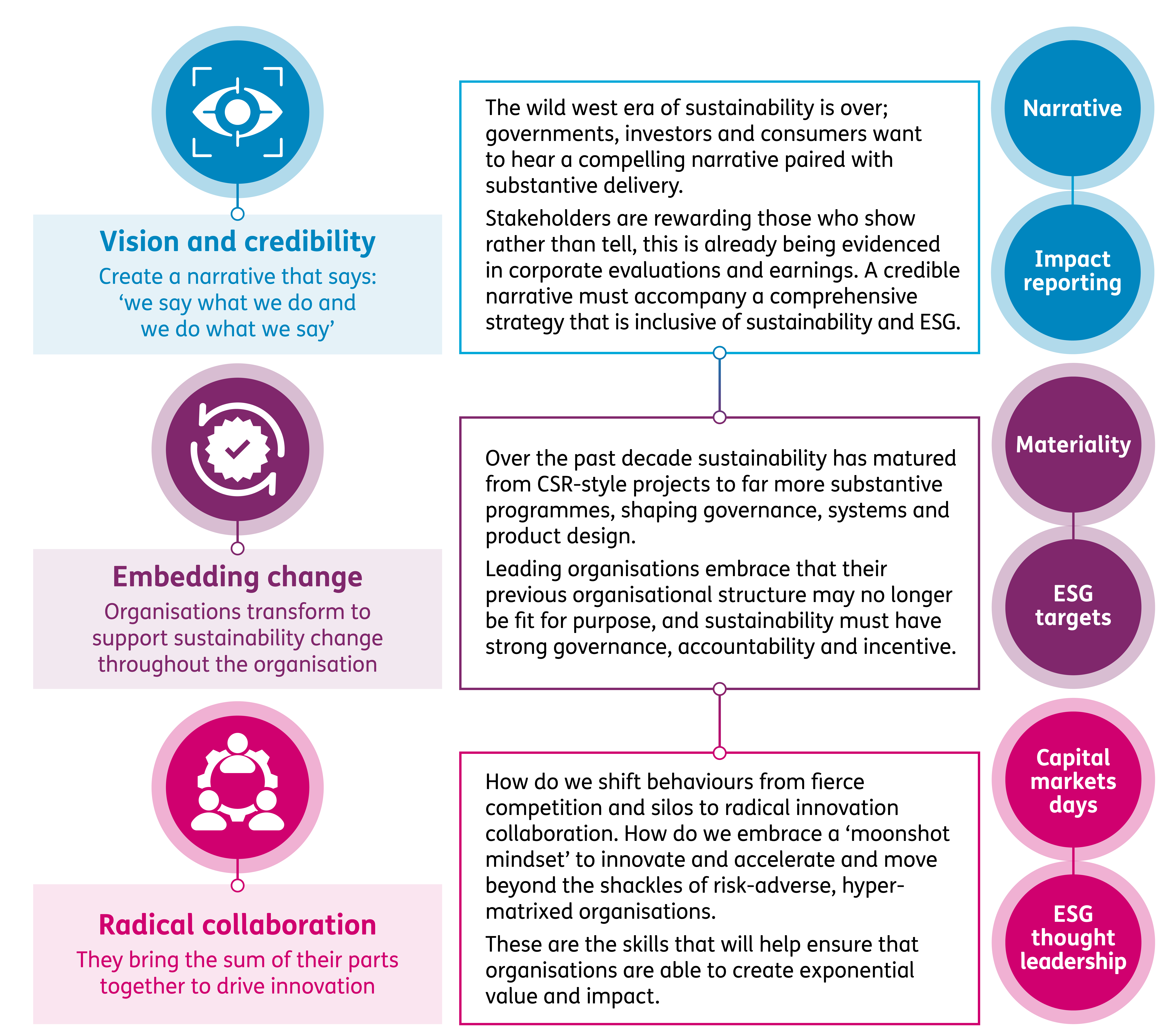In our first article, Sustainaility leadership, priorities and value creation potential in telco, we discussed the importance of reducing greenhouse gas (GHG) emissions, closing the digital divide and identifying the biggest wins for your organisation.
In part two, we consider how to:
- Ensure action delivers impact – how organisations execute their Climate and Sustainability transformation is a critical determinant of success.
- Take a stakeholder centric approach to execution – successful implementation is dependent upon stakeholder buy-in, focus on the value creation potential of Climate and Sustainability.
- Landing the change – via direct and indirect levers
Sustainability trends indicate how to maximise impact in execution
Having identified where your greatest opportunities lie, aligned to your business model and capabilities, does not guarantee success.
We’ve found these three critical enablers can help embed sustainability effectively and are a common feature for leading organisations in the sustainability space.

Taking a stakeholder-centric approach to execution
If working within the sustainability domain, the importance of climate and sustainability initiatives is a given. These teams understand the call to action, but the case for change may not be as compelling for all stakeholders.
Reframe the business case to unlock the resources required to implement your climate and sustainability strategy. By aligning sustainability initiatives with the company, business unit or function-level KPIs (Key Performance Indicators) and OKRs (objectives and key results), the benefits can be far more compelling.
This makes a clear case for climate and sustainability as a value driver not just a compliance activity, maximising shareholder value by growing revenues, minimising operational risks, and ensuring a resilient business model. Much as the business case for a product launch or IT upgrade call on cost savings or revenue generation, so too must climate and sustainability initiatives.
Successfully landing this approach to stakeholder buy in evidences the value of climate and sustainability and wins hearts and minds in the process.
The case for climate and sustainability initiatives as a driver of incremental value is evident across stakeholder groups:

Despite an economically challenging 2023, investment is set to continue in the sector given robust underlying drivers.1 Utilising sustainability to drive top line growth and reduce costs is a powerful driver of Board and management support for ESG initiatives.
Example - UAE based asset manager who recently invested over £800M in a major UK fibre network operator, cited their sustainability credentials as the determining factor for the investment board’s approval.

Whether a B2B operator who directly impacts a customer's Scope 3 emissions or a B2C where sustainability credentials can drive purchasing choices, sustainability can be a critical differentiator in the race to gain market share.
Example - Research found “77% of respondents willing to pay more for broadband with a lower carbon footprint”.2 Evidence shows 84% of operators are more likely to work with vendors that use energy-efficiency labelling that demonstrate their sustainability credentials3.

In a sector with a track record of underperformance in gender balance and skills shortages across the value chain, the increasing importance of a company’s ESG credentials to job seekers’ decision making needs to be authentically addressed to attract and retain talent.
Example - “New research reveals over half (53%) of the UK’s workforce say sustainability is an important factor in choosing a company to work for. However, 31% feel sustainability is just a tick box exercise for their employers. Investing in sustainability…attracts top talent.”4

Continued regulatory pressure from Ofcom, deployment of Project Gigabit5 and ongoing budgetary pressures, necessitates a clear ‘social value’ narrative for organisations with evidence to authenticate the ensuing impact on communities.
Example - Local Government Association (LGA) is encouraging Councils to increase the weighting of Social Value criteria when awarding contracts to increase financial self-reliance in challenging times.6 Usually a 10% weighting, Social Value can be as high as 30%, becoming a key determinant of success for operators looking to secure public sector contracts.

With incoming CSRD legislation mandating the measuring of Scope 3 emissions, suppliers have become a critical stakeholder that operators need to collaborate closely with, shifting from the traditionally transactional relationship to one as strategic partners.
Example - Ofcom estimates >60% of telecoms providers’ GHG emissions are produced by Scope 37, the scale and complexity of which necessitated the Climate and Sustainability Working Group (CSWG), laying the groundwork for industry collaboration. GSMA noted the challenge of substantial variation in reporting requirements and a lack of practical guidance, attempting to ‘harmonise’ guidance for the industry with the GeSI and ITU-T8.

With fixed and mobile connectivity increasingly seen as a fourth utility, the fundamental need for all of society to have digital access, skills and equipment has never been more important.
Example - “Unequal opportunities to access online platforms and services can deepen inequalities, and the benefits of accessing online are not always equitably distributed. Meaningful access is vital for social, political, and economic empowerment and therefore narrowing digital divides needs to go beyond simply reaching basic internet connectivity.”9
By leveraging one or more of these enablers, and targeting specific stakeholder groups, telecommunications leaders can help embed sustainability at the core of their businesses, but also drive long-term value by bringing critical stakeholders onboard for your journey.
What can organisations do and what outcomes should they expect?
Telcos have several levers to affect change, either directly addressable or influenced through stakeholder engagement.
Directly effect:
- Education and understanding of stakeholders
- Integrate sustainability strategies into corporate planning process
- Quality of sustainability data
- Operating model changes that deliver efficacy
- Decarbonisation of other industries through digital innovation
- Reduction of Scope 1&2 emissions via energy efficiency
Indirectly effect:
- Scope 3 emissions across the supply chain
- Benchmark with market peers (national and global level) to drive performance improvement
- Investor and shareholder engagement of sustainability / transition plans
- Government and regulators carbon price setting
- Customer perceptions of sustainability credentials
Leading, forward-thinking telecommunications organisations know that now is the time to move from talk to action and fast-track their sustainability ambitions, across carbon, nature, and social impact. They understand they have a tremendous opportunity, and responsibility to advance connectivity, and use tools like 6G, AI and IoT to advance not only digital inclusion, but also become pioneers to advance rapid decarbonisation. In particular, these organisations can think about sustainability as helping their business by:
- Build momentum: Track and record commercial benefits of Climate and Sustainability, lending credibility and advancing the business case for more sustainable growth.
- Bring purpose to life: Greater engagement and understanding of the relevance and value of Climate and Sustainability across the business, both amongst employees and customers.
- Converting intent to results: Positive and sustainable impact directly attributable to the organisation, externally validated and recognised.
Read the first article in this two-part series - Sustainaility leadership, priorities and value creation potential in telco - to discover the importance of reducing greenhouse gas (GHG) emissions, closing the digital divide and identifying the biggest wins for your organisation.
To find out more about sustainable leadership, our work in the sector and across the climate and sustainability agenda, get in touch with Jon Roberts or Darshan Grover.
1 2024 Outlook: Technology, Media and Telecoms; Barclays
2 The Cisco Broadband Survey; 2023
3 ‘A Third of UK Broadband Leaders Shun Energy Efficiency Labelling’; ISP Review; January 2023
4 ‘Research Reveals Sustainability Is Vital for Employee Attraction and Retention’; Anthesis; April 2021
5 ‘Social Value – achieving community benefits’; LGA; 2022
6 Ofcom Connected Nations Report 2023
7 ‘Scope 3 Guidance for Telecommunications Operators’; GSMA; June 2023
8 Roundtable on Digital Inclusion; UN; 2023
Our Experts


Related Insights

Turbocharging the supply chain
Why network operators are investing in this capability to support the next wave of growth and innovation (and what to focus on now)…
Read more
A tipping point for telco cyber security
Four priorities security leaders need to be adopting to succeed in this complex and high-risk environment.
Read more
Lessons from other sectors for network operators
Rob Bradford, Supply Chain Procurement Director at Baringa, discusses supply chain opportunities for network operators, as well as how telcos can learn from other sectors.
Read more
Networks capability in telcos
Watch video of Baringa's Rob Bradford talking about the networks capability in telcos
Read moreRelated Case Studies

Digital transformation of a global insurance company’s IT infrastructure
How do you fully refresh and upgrade IT to help employees and critical systems?
Read more
Helping a telco turn digital transformation into competitive edge
How can a large telco unlock the advantages of digitalised operations and agile ways of working?
Read more
Deploying critical IT Infrastructure to enable a global cosmetics organisation to operate in China’s c£3.5Bn market
How can you set up your IT infrastructure to run in China?
Read more
Delivering strategic enterprise transformation at a major UK telecommunications firm
How do you design, steer and support a multi-million pound transformation programme?
Read more

